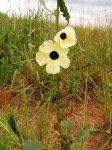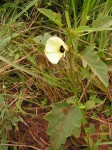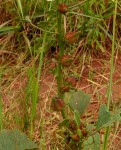| Home | > | List of families | > | Malvaceae subfamily Malvoideae | > | Hibiscus | > | calyphyllus |
Hibiscus calyphyllus
Selected images: Click on each image to see a larger version and details of the record View all images (8)
Detailed records: Display species records QDS maps by: Google Maps Point records by Google Maps
Species details: Click on each item to see an explanation of that item (Note: opens a new window)
| Synonyms: |
Hibiscus borbonicus Link Hibiscus calycinus Willd. Hibiscus calyphyllus var. grandiflorus De Wild. Hibiscus grandifolius Hochst. ex A.Rich. Hibiscus wildii Suess. |
| Common names: | Lemon Yellow Rosemallow (English) |
| Frequency: | |
| Status: | |
| Description: |
Shrub or perennial herb up to 3 m tall; stems tomentose or pubescent when young, later glabrescent. Leaf-lamina up to 12 × 12 cm, suborbicular in outline, obscurely or distinctly 3–5-lobed, stellate-pubescent or stellate-pilosulose above, stellate-pubescent or stellate-pilose or stellate-tomentose beneath, apex acute, margin serrate, base cordate or subcordate; petiole usually up to 9 (18) cm long, stellate-pilose; stipules up to 15 mm long, filiform or subsetaceous, somewhat expanded at the base. Flowers up to 12 cm in diam., yellow usually with a brownish or dark red centre, solitary, axillary; peduncle c. 7 (10) mm long, stellate-pubescent, usually rather inconspicuously articulated near the base. Epicalyx of 5 bracts, stellate-pubescent; bracts up to 18 mm long, varying greatly in shape but nearly always broadest near the middle then narrowed suddenly to a caudate tip which is a prolongation of the midrib, joined for 3–4 mm at the base. Calyx up to 16 mm long, stellate-tomentellous; lobes ovate to ovate-lanceolate, usually 3-nerved, joined to nearly half-way. Petals up to 6 × 4.5 cm, obliquely obovate, pubescent outside, glabrous within. Capsule 25 × 15 mm, ellipsoid; valves aristate. Seeds 3 × 2.5 mm, subreniform, tomentellous. |
| Type location: |
Ethiopia |
| Notes: | |
| Derivation of specific name: | calyphyllus: with leaf-like calyx |
| Habitat: | |
| Altitude range: (metres) | |
| Flowering time: | Feb - May |
| Worldwide distribution: | Saudi Arabia south through East, Central and Southern Africa as well as Reunion and Mauritius |
| National distribution: | |
| Growth form(s): | Perennial. |
| Endemic status: | |
| Red data list status: | |
| Insects associated with this species: | |
| Spot characters: | Display spot characters for this species |
| Literature: |
Kirby, G. (2013). Wild Flowers of Southeast Botswana Struik Nature, Cape Town South Africa Page 199. (Includes a picture). Setshogo, M.P. (2005). Preliminary checklist of the plants of Botswana. Sabonet Report no. 37. Sabonet, Pretoria and Gaborone Page 84. |
Other sources of information about Hibiscus calyphyllus:
Our websites:
Flora of Botswana: Hibiscus calyphyllusFlora of Burundi: Hibiscus calyphyllus
Flora of Caprivi: Hibiscus calyphyllus
Flora of Zambia: Hibiscus calyphyllus
External websites:
African Plants: A Photo Guide (Senckenberg): Hibiscus calyphyllusBHL (Biodiversity Heritage Library): Hibiscus calyphyllus
EOL (Encyclopedia of Life): Hibiscus calyphyllus
GBIF (Global Biodiversity Information Facility): Hibiscus calyphyllus
Google: Web - Images - Scholar
iNaturalist: Hibiscus calyphyllus
IPNI (International Plant Names Index): Hibiscus calyphyllus
JSTOR Plant Science: Hibiscus calyphyllus
Mansfeld World Database of Agricultural and Horticultural Crops: Hibiscus calyphyllus
Plants of the World Online: Hibiscus calyphyllus
Tropicos: Hibiscus calyphyllus
Wikipedia: Hibiscus calyphyllus
| Home | > | List of families | > | Malvaceae subfamily Malvoideae | > | Hibiscus | > | calyphyllus |



